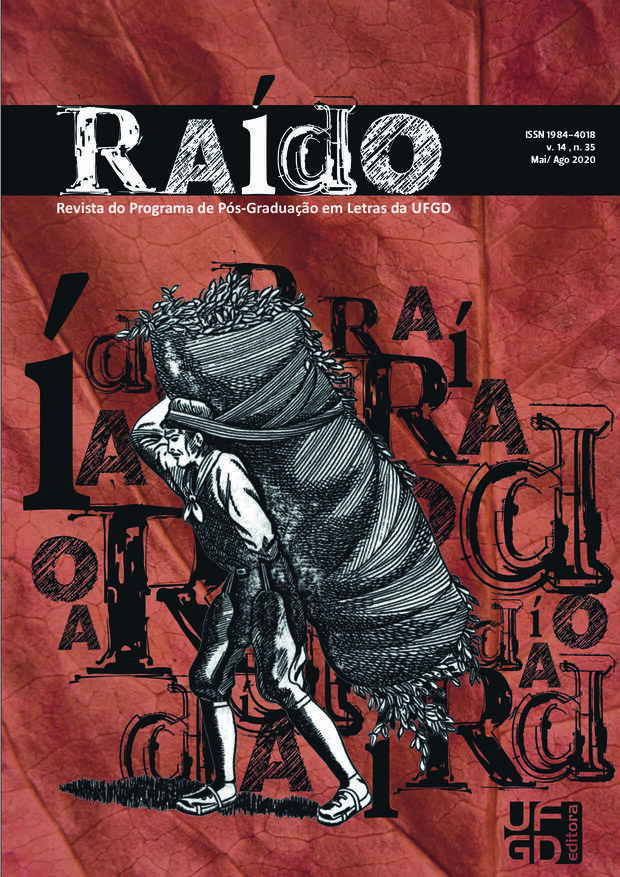Volto semana que vem: democracy above all!
DOI:
https://doi.org/10.30612/raido.v14i35.12179Keywords:
Contemporary literatura Brazilian. Latin America. Dictatorship, resistance, women and policy. Literature, history and memory. Maria Pilla.Abstract
In the last decades it has been noticed a significant growth of Latin American fictions which have recreated dictatorships established in our continent last century. In Brazil, Maria Pilla’s Volto semana que vem [I will be back next week] (2015) emerges as an important one. In her book, the author recollects events of her childhood and youth, as well as memories of her militancy which was marked by periods in jail in Argentina and exile in France. We consider that Pilla’s fiction makes it possible a productive dialog between literature and history in Latin America, as it brings up characters’ accounts which portray resistance towards civic and military regimes in the Southern Cone. Thus, we intend to examine how the writer has fictionalized the shameful episodes in our continent during regimes of exception. We believe that human rights violations practiced by dictatorial governments cannot be forgotten. Instead, we think of the necessity to practice our duty of memory, following Ricouer (2007). In this sense, this study aims at contributing to memories preservation of democracy defenders, since they are at risk of being erased from the so-called official history. Our theoretical framework is supported by Dalcastagné (1996), Esteves (2010), Figueiredo (2017), Prado and Pelegrino (2016), among others.Downloads
References
DALCASTAGNÉ, R. O espaço da dor. Brasília: Ed. UNB, 1996.
ESTEVES, A. O romance histórico brasileiro contemporâneo (1975-2000). São Paulo: Ed. UNESP, 2010.
FIGUEIREDO, E. Mulheres ao espelho: autobiografia, ficção, autoficção. Rio de Janeiro, EdUERJ, 2013.
FIGUEIREDO, E. A literatura como arquivo da ditadura brasileira. Rio de Janeiro: 7 Letras, 2017.
LÍSIAS, R. Literatura brasileira e os tempos da ditadura. Recife: Suplemento Pernambuco, 2018. Disponível em: https://www.suplementopernambuco.com.br/edi%C3%A7%C3%B5es-anteriores/77-capa/2166-literatura-brasileira-e-os-tempos-da-ditadura.html. Acesso em: 30 mar. 2020.
PILLA, M. Volto semana que vem. São Paulo: Cosac Naify, 2015.
PILLA, M; PAIM, L.; PORTO, A. Maria Regina Pilla relembra momentos da ditadura e de tortura, sem rancor ou truculência. Porto Alegre: Jornal Sul21, 15 nov. 2015. Disponível em: http://www.sul21.com.br/jornal/maria-regina-pilla-relembramomentos-da-ditadura-e-de-tortura-sem-rancor-ou-truculencia/. Acesso em: 10 abr. 2020.
PRADO, M. L.; PELEGRINO, G. História da América Latina. São Paulo: Contexto, 2014.
RICOUER, P. A memória, a história, o esquecimento. Tradução de Alain François et.al. Campinas: Editora da UNICAMP, 2007.
TELES, E. ; SAFATLE, V. O que resta da ditadura: a exceção brasileira. São Paulo: Boitempo, 2010.
WEINHARDT, M. Filhos da geração de 1960-70: herdeiros da memória. In: WEINHARDT, M. Ficções contemporâneas: história e memória. Ponta Grossa: Ed. UEPG, 2015.
Downloads
Published
How to Cite
Issue
Section
License
Os autores devem aceitar as normas de publicação ao submeterem a revista, bem como, concordam com os seguintes termos:
(a) O Conselho Editorial se reserva ao direito de efetuar, nos originais, alterações da Língua portuguesa para se manter o padrão culto da língua, respeitando, porém, o estilo dos autores.
(b) Autores mantém os direitos autorais e concedem à revista o direito de primeira publicação, com o trabalho simultaneamente licenciado sob a Atribuição-NãoComercial-CompartilhaIgual 3.0 Brasil (CC BY-NC-SA 3.0 BR) que permite: Compartilhar — copiar e redistribuir o material em qualquer suporte ou formato e Adaptar — remixar, transformar, e criar a partir do material. A CC BY-NC-SA 3.0 BR considera os termos seguintes:
- Atribuição — Você deve dar o crédito apropriado, prover um link para a licença e indicar se mudanças foram feitas. Você deve fazê-lo em qualquer circunstância razoável, mas de nenhuma maneira que sugira que o licenciante apoia você ou o seu uso.
- NãoComercial — Você não pode usar o material para fins comerciais.
- CompartilhaIgual — Se você remixar, transformar, ou criar a partir do material, tem de distribuir as suas contribuições sob a mesma licença que o original.
- Sem restrições adicionais — Você não pode aplicar termos jurídicos ou medidas de caráter tecnológico que restrinjam legalmente outros de fazerem algo que a licença permita.



